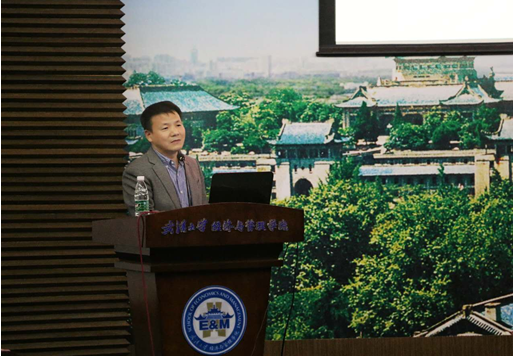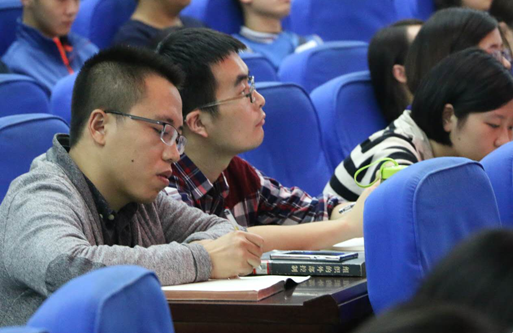In the afternoon of October 20th, professor Ye Chusheng from Economics and Management School (EMS) delivered his keynote speech on the standard, academic character and ideology of economic studies to fresh postgraduates from EMS in the Greenwood Lecture Hall. Such introductory speeches for freshmen on academic research principles by eminent specialists are essential components of EMS’s annual events during the Postgraduates’ Academic Morality Cultivation Month, which was held for several years.

Professor Ye Chusheng at the lecture
The standard and character of economic studies
Professor Ye Chusheng, a distinguished professor of economics, editor-in-chief of Economics Review, is widely respected for his intellectual pursuit and his concern for students which won him the title of Good Supervisor of My Eye in 2015, before he turned to economics in 1998, he also pursued advanced mathematics, impulse and digital circuit, the science of logic and philosophy. During his speech, professor Ye delivered his principles in three interrelated parts: the standard, characteristics and the ideology of economic studies.
“I classify economic papers into three categories according to the readers the author wants to present to, which are essays for the mass, essays for policymakers and standard academic papers for economists; among these, the third one is the very kind of paper you should learn to write.” Professor Ye explained that the true sense of the academic paper is to present the innovative research outcome and its derivation process in a professional and normalized structure, which would be judged and criticized by colleagues.
When it came to the academic character of a paper, professor Ye made an analogy, he compared the standard of a paper to people’s figure, then the academic character is people’s appearance. This essential characteristic distinguishes a successful academic paper from other essays, whether or not an analysis and solution is viewed as a professional piece, is actually a matter of research paradigm. Professor Ye suggested that academic study requires the application of frontier scientific paradigm. This theory-adjusting and practice-testing process is also accompanied by the unceasing improvement of methods and tools, therefore paradigm-leading studies also bring about higher quality academic degrees.

Fresh postgraduate students from Economic and Management School are taking notes
“It’s the ideas and thoughts that count”
“I said that the standard of a paper is one’s figure, and academic character is one’s appearance, then the ideas and thoughts behind a paper is one’s soul.” Professor Ye spoke highly of the ideology of research, he deemed that a thoughtful paper is telling an interesting story, behind this is the author’s motivation to choose topics. “Why you write a paper”, professor quizzed, “besides the rigid demands of graduation or promotion, personally I believe there are three motivations that sustain researchers to explore new worlds, which are the lively curiosity for the unknown, the longing for academic, and most importantly, a compassionate temperament towards the general public.”
Professor Ye illustrated the last motivation through the case of professor Zhang Peigang, the eminent alumni, inaugurator and grandmaster of development economics. Professor Ye told the audience that when professor Zhang first went to Harvard Business School in 1941, he was confused that what his teachers taught served only to make one’s own living instead of building a strong and powerful country. Then professor Zhang transferred to the economics department, but still, the development experience of western countries was inappropriate to the impoverished China back then, consequently he chose Agriculture and Industrialization as his doctoral thesis’s topic out of his keen concern for his motherland; this famous doctoral thesis is now considered to be the opening chapter of development economics.
“Your ideas and thoughts are profound insights for social problems, and is a highly condensed version of your studies”, professor Ye remarked, “a phenomenon has emerged in recent years, that scholars and students inclined to cover their paucity of thoughts by using sophisticated models and methods, such papers may be standard or academic to some degree, but not with good taste. Never forget that it’s your ideas and thoughts, your irreplaceable enthusiasm for academic that count.”
“Concentrating on your study is ultimately the highest academic morality”
After professor Ye elaborated on his instructive advices, we made a brief interview on how to cultivate postgraduates’ academic morality, which was in line with the topic of this annual event. Professor Ye thought highly of the application of frontier methods and tools by current students, which was unthinkable for postgraduate student decades before, meanwhile he also expressed his concern over a universal phenomenon in student groups nowadays.
“Not only in my workshop, but it’s a widespread existence in nearly every professors’ eyes, that students are showing accumulating interest and concern for their internship, tests for certification such as CPA, and going abroad; thus these students spend much more time on these affairs instead of their research and studies.” Professor did not object nor deny these students’ efforts, but he sincerely advised that a man of limited time and energy cannot pay attention to both academic studies and these goals, “maybe some measures should be taken to distinguish students of academic ambition from those who attach more importance to professional accomplishments; we all have our own aspirations after all, but at least for academic masters, commitment to academic studies ought to be their priority. In other words, concentrating on your study is ultimately the highest academic morality.”
“A thought-leading academic, along with an academic-tempered mindset”, professor Ye quoted the motto of the Economic Review, which is also his expectation towards students, “enjoy your study, enjoy the time when you are fully absorbed in something, your harvest would be fruitful and what you yield would be a comprehensive enhancement of your academic ability and thought.”
(Photo by Shi Weimin, Edited by Edmund Wai Man Lai & Hu Sijia)